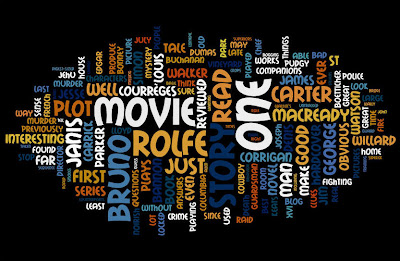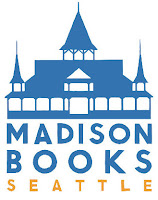 Laura Wilson watches fellow author Rennie Airth sign a copy of his first novel at this year’s convention in Bristol.
(Author’s note: I confess to being a bit behind in posting. Actually, more than a bit. For instance, it was only as I packed to attend this last weekend’s Theakstons Old Peculiar Crime Writing Festival in Harrogate, England, that I finally found some free time in which to look back on my experiences during Britain’s other big crime-fiction convention, CrimeFest, which took place in mid-May. Sorry for the tardy reporting, but it couldn’t be helped.)
Bristol
Laura Wilson watches fellow author Rennie Airth sign a copy of his first novel at this year’s convention in Bristol.
(Author’s note: I confess to being a bit behind in posting. Actually, more than a bit. For instance, it was only as I packed to attend this last weekend’s Theakstons Old Peculiar Crime Writing Festival in Harrogate, England, that I finally found some free time in which to look back on my experiences during Britain’s other big crime-fiction convention, CrimeFest, which took place in mid-May. Sorry for the tardy reporting, but it couldn’t be helped.)
Bristol-based CrimeFest, organized by Adrian Muller and Myles Allfrey, is now in its fourth year--if you count
2006’s Left Coast Crime as that event’s premiere. It has always been based at the
Bristol Marriott Royal Hotel in College Green, which I find an excellent venue, with a gym, pool, sauna, and steam room that are ideal places for
Shots editor Mike Stotter and I to chill out, and also sweat out our overindulgences. Crucially, the hotel’s bar remains open into the late hours, and offers a terrace for those of us who have found it hard to quit
our tobacco addictions.
It’s great to come out to Southwest England each year, meet up with friends and colleagues, and relax in a comfortable and familiar environment--while also celebrating and learning more about the crime and thriller fiction genre. With the economy in mind, I must add that CrimeFest is a rather exceptional value for the money; as well as the traditional goodie bag, it offers many giveaways during panel discussions, and the raffles are tremendous fun. This year there were some interesting off-site events, as well, such as a screening at the Arnolfini Contemporary Arts Center of director
Mike Hodges’ 1971 film,
Get Carter. With all the woes now facing the publishing industry, it’s heartening to see events such as CrimeFest draw substantial attendance. The efforts of Muller, Alfrey, and company need to be supported.
Day One, May 20: I arrived in Bristol on Thursday to meet my
Shots compatriots Mike Stotter and
woman of mystery Ayo Onatade. After registering at the hotel, we headed off for a quick gin-and-tonic and a snoop around the panel discussions. It must have been the heady fragrance of gin that attracted Detectives Beyond Borders blogger Peter Rozovosky,

with whom I always enjoying spending time. This was his second visit to Bristol, and again he came armed with his Netbook, so he could
blog all weekend.
I was surprised to see how many other people were on hand for the convention this early. As a man of liberal sensitivities and outlook, I enjoyed the social commentary panel “Punishment Fits the Crime,” which featured former Crime Writers’ Association (CWA) chair
Lesley Horton,
Adrian Magson, Clare Seeber, and
Edward Marston, and was moderated by author Steve Mosby. That group made what could have been a very dry hour into a lively debate. Afterward, I spent plenty of time and money milling around the book room, as I’m one of those people who lives by the adage “you can never have enough books.” I think it was a wonderful idea to place the book room opposite the signing rooms, and right between the two main panel venues. I heard someone mutter that bookseller Blackwells sold many more books this year than in 2009, which I saw as an encouraging development.
Thursday evening’s highlight, of course, was the CrimeFest Pub Quiz, which was adroitly managed by writer-critic Peter Guttridge. I teamed up with Crème de la Crime publisher Lynne Patrick and her charming husband. The spirit of competition was at fever pitch, though--seriously--the CrimeFest quiz is a great “ice-breaker” for attendees, and thanks to Guttridge, it was an educational experience to boot. As predicted, the winners for the second year in a row was the
über team of
Martin Edwards,
Ann Cleeves, Maxine Clarke of
Petrona, Karen Meek of
Euro Crime, Cath Staincliffe, and Rik and Carol Shepard. And the prize? Books, naturally--as if these people really need to brush up on their reading! Then it was back to the bar. When my head start spinning, I elected to make it an early night, though my sleep was somewhat scuppered by Stotter’s persistent snoring in the adjacent bed, and his tendency to sing Mary Poppins tunes in his sleep--behavior I’d
encountered previously at ThrillerFest 2007.
Day Two, May 21: This day’s panels were run on two tracks. That split the audience into two streams, but because there were lots of people around, there were plenty of bums on seats. I began the day by listening to a discussion titled “Down in the Sewer: Violence, Language & Sex” featuring Ruth Dudley Edwards, M.R. Hall, Bill James, Caro Ramsay, and moderator Janet Laurence. The thing about CrimeFest panels is that they tend to be light-hearted, even when they are probing a very serious subject. A case in point was my next panel, “Grimly Fiendish: Whatever That Means!” with speakers
Chris Ewan,
Helen Fitzgerald, Steve Mosby,
Zoë Sharp, and Donna Moore, who also served as the moderator. I often discover new writers through these panel talks, as I did last year when I first heard Chris Ewan. This year I took a chance and picked up Helen Fitzgerald’s work after listening to her on the panel.
After a liquid lunch it was all go, with events headlined by the mandatory Stieg Larsson panel. I hope you all remember that it was
The Rap Sheet that predicted, way back in December 2007, that
The Girl with the Dragon Tattoo would become a global sensation--even before the novel was first released in the UK. CrimeFest’s Larsson panel discussion was wonderfully funny, moderated by critic Marcel Berlins, with
Maxim Jakubowski stepping in for Italian novelist
Giorgio Faletti (who had been taken ill) and joined by Ann Cleeves, who’s championed translated crime fiction for many years. The only non-Brit member of this panel was Icelander
Yrsa Sigurðardóttir, who told us that she was a little embarrassed that a novel she wrote several years ago,
Ashes to Dust, was being published in English in 2010, without so much as
a mention of that erupting Icelandic volcano that’s caused such havoc for European airline passengers. No Stieg Larsson panel would be complete without some insights from his
biographer, Barry Forshaw, who kept CrimeFest-goers enthralled with his take on the Larsson legend. I especially enjoyed Berlins’ contributions, though. He told us about his recent meeting in Stockholm with Swedish wordsmith Henning Mankell, who apparently prefers the BBC/Kenneth Branagh version of the TV series
Wallander (made from Mankell’s books) to
Krister Henriksson’s interpretation from Yellow Bird Productions. I must say that my opinion, and that of many of my colleagues, is precisely the opposite. Branagh’s performances have been
way over the top, and I’m surprised that a third series of his
Wallander has been ordered. With all the angst his protagonist shows, it’s a wonder he hasn’t “topped himself” by now.
There was no rest for conference attendees, as
The Telegraph’s Jake Kerridge was on hand to interview historical writers Rennie Airth (
River of Darkness) and Laura Wilson (
Stratton’s War) on stage. Being an enthusiastic follower of both those authors, Kerridge’s exchange was a tremendous treat.
Afterward I headed over to listen
The Curzon Group panel. This assembly comprised an eclectic bunch of British thriller writers--Richard Jay Parker, Leigh Russell, the pseudonymous journalist and conspiracy theory magnet
Tom Cain, and former ghostwriter Matt Lynn--who intend to “reclaim” the reigns of the thriller from American authors. Moderated by Zoë Sharp, this discussion was less controversial that I had expected, since Curzon members have (wisely) dropped much of their
initial jingoism in favor of concentrating on the craft of writing and promoting thriller fiction.
Then, with no time for a drink in between, I hied quickly over to see the CWA present
this year’s initial lists of Dagger Award nominees. It was good thinking to use CrimeFest, and later
the Harrogate Crime Writing Festival, as platforms for announcing the Dagger shortlists and winners, bringing a maximum of international attention to both.
CrimeFest continued on Friday evening with a presentation at the Arnolfini Contemporary Arts Center by director Mike Hodges and another screening of
Get Carter. Due to Giorgio Faletti’s illness, however, the Constable and
Goldsboro book launch was cancelled, which only meant more trade for the bar--and in the case of Stotter and me, some strong coffee and an aspirin requirement for the morning.
 Author Colin Dexter (seated on the right) backed up by CrimeFest organizers Adrian Muller and Myles Allfrey.
Day Three, May 22:
Author Colin Dexter (seated on the right) backed up by CrimeFest organizers Adrian Muller and Myles Allfrey.
Day Three, May 22: Rather than continuing with the two-panel track on Saturday, the CrimeFest gang arranged for a solo panel track (to maximize attendance), but concurrently offered 20-minute “In the Spotlight” interviews with many of the authors on hand. I have to state that, for my money, that day’s
Gyles Brandreth interrogation by Peter Guttridge was the red-letter occasion. I don’t think I have ever laughed so much at Brandreth’s worldview, as he was kept on his “roll” but Gutteridge’s probing. A wonderfully cheerful man, Brandreth ought to be brought in as a replacement for the downbeat BBC economics team; his witty reflections on the state of the world’s economy and his self-deprecating manner simply made listeners feel better about their lot. Other Saturday highlights: Tonino Benacquista being interviewed by Ann Cleeves; Inspector Morse creator
Colin Dexter submitting to questions from Maxim Jakubowski; and the “Last Laugh” panel, moderated by Donna Moore. I managed to nip in and out of several of the 20-minute “In the Spotlight” talks, the most memorable being Chris Carter’s serial-killer talk, which probably wasn’t for anyone with a weak stomach.
Thoroughly exhausted after such a packed and stimulating day, I was pleased to get a few drinks in, courtesy of Maxim Jakubowski and John Blake Publishing at the launch of their
brand-new Max Crime imprint. This proved to be a terrific event, prefect for lining one’s stomach with wine in advance of CrimeFest’s Gala Dinner.
That meal was exceptional, with food provided by the Bristol Marriott and Brandeth serving as the evening’s master of ceremonies. In a rather surreal twist, I was seated next to
Saul Reichlin, who has narrated the unabridged audio versions of Stieg Larsson novels. Unfortunately, Reichlin had to leave the Gala Dinner early in order to catching a train back to London, so it wasn’t until later that he learned
he had won the Sounds of Crime Award for best unabridged audiobook, while his colleague Martin Wenner took home the commendation for best abridged audio, both for their work on Larsson audiobooks.
Following the repast, everyone decamped once more to the bar and celebrated this genre we all find so delightful. I finally set off for bed after the smoking balcony closed, with Stotter retiring much,
much later.
Day Four, May 23: I was up far too early in order to attend
Anne Zouroudi’s panel with Yrsa Sigurdardottir, Michael Ridpath, Peter Guttridge, and Joan Brady. This was advertised--not incorrectly--as an amusing look at profanity, sex, drugs, and rock ’n’ roll. Then it was on to Martin Edwards’ panel about “forgotten authors,” which brought together Suzette Hill, Caro Ramsey, the two men
who, under the pseudonym Michael Stanley, write Africa-based mysteries, and the mother and son behind the byline
Charles Todd. This panel provided a real international flavor, and lots of welcome memories, recalling the work of such late wordsmiths as
Alistair MacLean and
Desmond Bagley.
 Contenders in the Criminal Mastermind Competition, left to right: Peter Guttridge, Ali Karim, Martin Edwards, and Cara Black.
Contenders in the Criminal Mastermind Competition, left to right: Peter Guttridge, Ali Karim, Martin Edwards, and Cara Black.
Heading back to my hotel room, I roused Mike Stotter with some strong coffee, then sped back downstairs to participate in the second annual CrimeFest Criminal Mastermind Competition. The question master was Maxim Jakubowski, and the four people charged with answering his queries on their selected topics were last year’s winner, Martin Edwards (who this time chose as his subject the novels of
Julian Symons), Peter Guttridge (who pronounced himself an expert on the films of
Jean-Pierre Melville), Cara Black (who chose French crime novels as her specialty), and yours truly (who went for the novels and films of
Thomas Harris). Straightway, it was clear that Black had selected the toughest of the topics, despite her having penned the wonderful
Aimée Léduc mystery novels, set in France. Once again, the winner of this knowledge contest was Martin Edwards, while Guttridge and I came in second, and Cara Black received a huge round of applause for merely surviving the truly obscure questions about French crime fiction delivered to her by the inscrutable Jakubowski, who is an authority on Italian and French works.
There was a final session that afternoon about the art of the translator, but I decided to ignore it in favor of joining Guttridge and Jakubowski in the bar. Stotter, now definitely on the mend after his late night of imbibing, finally joined us. It is always sad to leave CrimeFest, after spending such good times with people who share your passion for mystery and thriller fiction. So after finishing my drink, I took a few minutes to thank organizers
Allfrey and Muller for their extraordinary efforts in making CrimeFest 2010 such a worthwhile event.
I urge you all to attend next year’s convention in Bristol, because where else can you spend time talking about books and writing without feeling “odd” in these days when illiteracy seems to be spreading as fast as
Chlamydia? The reason I enjoy attending crime, mystery, and thriller conferences is that they so often lead to long-term friendships, many of which I recall through photographs. When the world around me looks so cold and gray, the smiling faces in my collection always lifts my spirits.
(Editors note: An edited version of this report, with photographs, is set to appear as a supplement to July’s CWA Red Herrings Magazine
.)
 and the 2012 non-fiction release 100 American Crime Writers. He is studying for a Ph.D. on the fiction of James Ellroy at Britain’s University of Liverpool, and blogs about crime fiction in The Venetian Vase.)
and the 2012 non-fiction release 100 American Crime Writers. He is studying for a Ph.D. on the fiction of James Ellroy at Britain’s University of Liverpool, and blogs about crime fiction in The Venetian Vase.)
































